现代大学英语精读3课文电子版
(完整版)大学英语精读3课文(第三版)_中英文对照
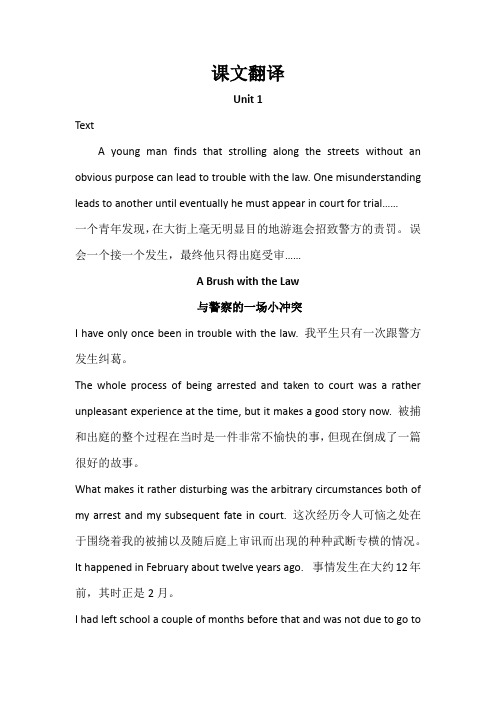
课文翻译Unit 1TextA young man finds that strolling along the streets without an obvious purpose can lead to trouble with the law. One misunderstanding leads to another until eventually he must appear in court for trial……一个青年发现,在大街上毫无明显目的地游逛会招致警方的责罚。
误会一个接一个发生,最终他只得出庭受审……A Brush with the Law与警察的一场小冲突I have only once been in trouble with the law. 我平生只有一次跟警方发生纠葛。
The whole process of being arrested and taken to court was a rather unpleasant experience at the time, but it makes a good story now. 被捕和出庭的整个过程在当时是一件非常不愉快的事,但现在倒成了一篇很好的故事。
What makes it rather disturbing was the arbitrary circumstances both of my arrest and my subsequent fate in court. 这次经历令人可恼之处在于围绕着我的被捕以及随后庭上审讯而出现的种种武断专横的情况。
It happened in February about twelve years ago. 事情发生在大约12年前,其时正是2月。
I had left school a couple of months before that and was not due to go touniversity until the following October. 几个月前我中学毕业了,但上大学要等到10月。
现代大学英语精读3Unit

determining what they are going to do every day
单击此处添加小标题
independence in handling everyday life situations; the ability to solve practical problems
experiencing; undergoing; suffering
… identity is determined by genetic endowment (what is inherited from parents), shaped by environment, and influenced by chance events.
para5
Probably nothing can make students feel…relationship with. When students are in a romantic relationship with the opposite sex, they are most likely to feel unhappy or happy emotionally.
The main idea of para5: Establishing their sexual identity
para5
para6
…was seeing his world shrink and his options narrow. …was beginning to realize that his world was getting smaller and his choices fewer. Shrink: become smaller in size Washing wool in hot water will shrink it. The vast forests of West Africa have shrunk.
现代大学英语-精读3-Diogenes-and-Alexander-原文
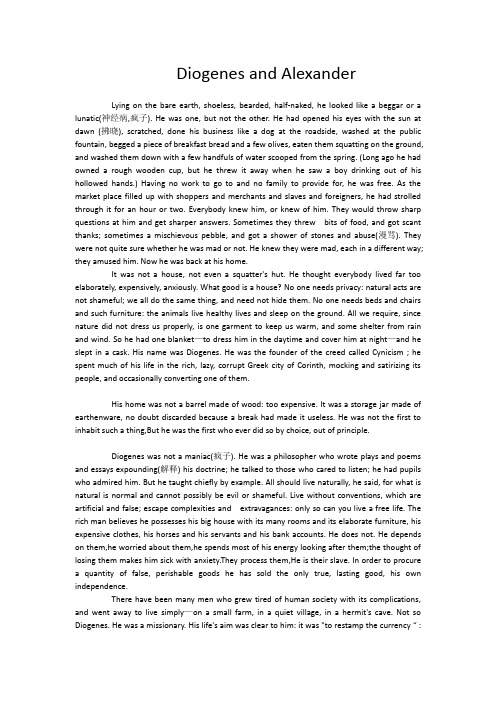
Diogenes and AlexanderLying on the bare earth, shoeless, bearded, half-naked, he looked like a beggar or a lunatic(神经病,疯子). He was one, but not the other. He had opened his eyes with the sun at dawn (拂晓), scratched, done his business like a dog at the roadside, washed at the public fountain, begged a piece of breakfast bread and a few olives, eaten them squatting on the ground, and washed them down with a few handfuls of water scooped from the spring. (Long ago he had owned a rough wooden cup, but he threw it away when he saw a boy drinking out of his hollowed hands.) Having no work to go to and no family to provide for, he was free. As the market place filled up with shoppers and merchants and slaves and foreigners, he had strolled through it for an hour or two. Everybody knew him, or knew of him. They would throw sharp questions at him and get sharper answers. Sometimes they threw bits of food, and got scant thanks; sometimes a mischievous pebble, and got a shower of stones and abuse(漫骂). They were not quite sure whether he was mad or not. He knew they were mad, each in a different way; they amused him. Now he was back at his home.It was not a house, not even a squatter's hut. He thought everybody lived far too elaborately, expensively, anxiously. What good is a house? No one needs privacy: natural acts are not shameful; we all do the same thing, and need not hide them. No one needs beds and chairs and such furniture: the animals live healthy lives and sleep on the ground. All we require, since nature did not dress us properly, is one garment to keep us warm, and some shelter from rain and wind. So he had one blanket—to dress him in the daytime and cover him at night—and he slept in a cask. His name was Diogenes. He was the founder of the creed called Cynicism ; he spent much of his life in the rich, lazy, corrupt Greek city of Corinth, mocking and satirizing its people, and occasionally converting one of them.His home was not a barrel made of wood: too expensive. It was a storage jar made of earthenware, no doubt discarded because a break had made it useless. He was not the first to inhabit such a thing,But he was the first who ever did so by choice, out of principle.Diogenes was not a maniac(疯子). He was a philosopher who wrote plays and poems and essays expounding(解释) his doctrine; he talked to those who cared to listen; he had pupils who admired him. But he taught chiefly by example. All should live naturally, he said, for what is natural is normal and cannot possibly be evil or shameful. Live without conventions, which are artificial and false; escape complexities and extravagances: only so can you live a free life. The rich man believes he possesses his big house with its many rooms and its elaborate furniture, his expensive clothes, his horses and his servants and his bank accounts. He does not. He depends on them,he worried about them,he spends most of his energy looking after them;the thought of losing them makes him sick with anxiety.They process them,He is their slave. In order to procure a quantity of false, perishable goods he has sold the only true, lasting good, his own independence.There have been many men who grew tired of human society with its complications, and went away to live simply—on a small farm, in a quiet village, in a hermit's cave. Not so Diogenes. He was a missionary. His life's aim was clear to him: it was "to restamp the currency “ :to take the clean metal of human life, to erase the old false conventional markings, and to imprint it with its true values.The other great philosophers of the fourth century BC,such as Plato and Aristotle, taught mainly their own private pupils.But for Diogenes, laboratory and specimens and lecture halls and pupils were all to be found in a crowd of ordinary people. Therefore, he chose to live in Athens or Corinth, where travelers from all over the Mediterranean world constantly came and went. And, by design, he publicly behaved in such ways as to show people what real life was.He thought most people were only half-alive, most men only half-men. At bright noonday he walked through the market place carrying a lighted lamp and inspecting the face of everyone he met. They asked him why. Diogenes answered, "I am trying to find a man."To a gentleman whose servant was putting on his shoes for him, Diogenes said, "You won't be really happy until he wipes your nose for you: that will come after you lose the use of your hands."Once there was a war scare so serious that it stirred even the lazy, profit-happy Corinthians. They began to drill, clean their weapons, and rebuild their neglected fortifications. Diogenes took his old cask and began to roll it up and down, back and forward. "When you are all so busy," he said, "I felt I ought to do something!"And so he lived—like a dog, some said, because he cared nothing for conventions of society, and because he showed his teeth and barked at those he disliked. Now he was lying in the sunlight, contented and happy, happier than the Shah of Persia. Although he knew he was going to have an important visitor, he would not move.The little square began to fill with people. Page boys , soldiers,secretaries, officers, diplomats, they all gradually formed a circle centered around Diogenes. He looked them over as a sober man looks at a crowd of tottering drunks, and shook his head. He knew who they were. They were the servants of Alexander, the conqueror of Greece, the Macedonian king, who was visiting his new realm.Only twenty, Alexander was far older and wiser than his years. Like all Macedonians he loved drinking, but he could usually handle it; and toward women he was nobly restrained and chivalrous. Like all Macedonians he loved fighting; he was a magnificent commander, but he was not merely a military automaton. He could think. At thirteen he had become a pupil of the greatest mind in Greece, Aristotle. who gave him the best of Greek culture. He taught Alexander poetry; the young prince slept with the Iliad under his pillow and longed to emulate Achilles, who brought the mighty power of Asia to ruin. He taught him philosophy, in particular the shapes and uses of political power and he taught him the principles of scientific research, and shipped hundreds of zoological specimens back to Greece for study. Indeed, it was from Aristotle that Alexander learned to seek out everything strange which might be instructive.Now, Alexander was in Corinth to take command of the League of Greek States which his father Philip created. He was welcomed and honored and flattered. He was the man of thehour, of the century; he was unanimously appointed commander-in-chief of a new expedition against old, rich, corrupt Asia. Nearly everyone crowded to Corinth in order to congratulate him, to seek employment with him.Only Diogenes, although he lived in Corinth, did not visit the new monarch. With that generosity which Aristotle had taught him, Alexander determined to call upon Diogenes.With his handsome face, his fiery glance, his strong supple body, his purple and gold cloak, and his air of destiny, he moved through the parting crowd, toward the Dog's kennel. When a king approaches, all rise in respect. Diogenes merely sat up on one elbow. When a monarch enters a place, all greet him with a bow or an acclamation. Diogenes said nothing.There was a silence. Alexander spoke first, with a kindly greeting. Looking at the poor broken cask, the single ragged garment, and the rough figure lying on the ground, he said, "Is there anything I can do for you, Diogenes?""Yes," said the Dog. "Stand to one side. You're blocking the sunlight."There was an amazed silence. Slowly, Alexander turned away. A titter broke out from the elegant Greeks. The Macedonian officers, after deciding that Diogenes was not worth the trouble of kicking, were starting to guffaw and nudge one another. Alexander was still silent. To those nearest him he said quietly, "If I were not Alexander, I should be Diogenes." They took it as a paradox.But Alexander meant it. He understood Cynicism as the others could not.He was what Diogenes called himself, a "citizen of the world." Like Diogenes, he admired the heroic figure of Hercules, who labored to help mankind while all others toiled and sweated only for themselves. He knew that of all men then alive in the world only Alexander the conqueror and Diogenes the beggar were free.。
现代大学英语精读3lesson10DiogenesandAlexander(可编辑)
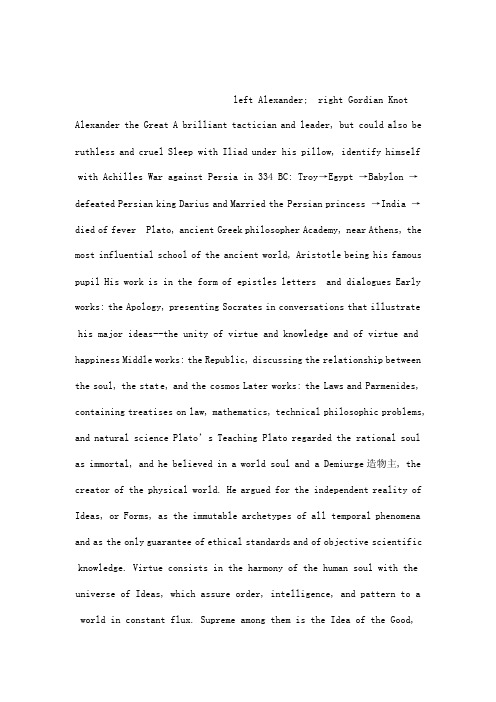
left Alexander; right Gordian Knot Alexander the Great A brilliant tactician and leader, but could also be ruthless and cruel Sleep with Iliad under his pillow, identify himself with Achilles War against Persia in 334 BC: Troy→Egypt →Babylon →defeated Persian king Darius and Married the Persian princess →India →died of fever Plato, ancient Greek philosopher Academy, near Athens, the most influential school of the ancient world, Aristotle being his famous pupil His work is in the form of epistles letters and dialogues Early works: the Apology, presenting Socrates in conversations that illustrate his major ideas--the unity of virtue and knowledge and of virtue and happiness Middle works: the Republic, discussing the relationship between the soul, the state, and the cosmos Later works: the Laws and Parmenides, containing treatises on law, mathematics, technical philosophic problems, and natural science Plato’s Teaching Plato regarded the rational soul as immortal, and he believed in a world soul and a Demiurge造物主, the creator of the physical world. He argued for the independent reality of Ideas, or Forms, as the immutable archetypes of all temporal phenomena and as the only guarantee of ethical standards and of objective scientific knowledge. Virtue consists in the harmony of the human soul with the universe of Ideas, which assure order, intelligence, and pattern to a world in constant flux. Supreme among them is the Idea of the Good,analogous to the sun in the physical world. Only the philosopher, who understands the harmony of all parts of the universe with the Idea of the Good, is capable of ruling the just state. Aristotle, ancient Greek philosopher At the age of eighteen Aristotle came to Athens from Macedonia in the north for the purpose of studying with Plato. Although he was an original thinker who made great contributions of his own, he remained a student in Plato's Academy for twenty years. his own school Lyceum an original and deep thinker, an observer, an organizer, a systematizer of knowledge. He laid the foundation of all sciences and philosophies by defining and classifying the various branches of knowledge: Psychology, Metaphysics, Politics, Rhetoric and Logic. Hercules Roman name ; Heracles Greek name A hero noted for his strength and courage and 12 labors As a baby, strangle two serpents sent by Hera; as a young man, cloak--the skin of a lion, helmet―its head; conquer a tribe and marry the princess of Thebes; in a fit of madness sent by Hera, kill his wife and 3 children, then told by the oracle at Delphi to perform 12 labors: Kill a lion that could not be wounded by any weapon; kill a monster in the swamp that has 9 heads, one immortal; capture alive a stag雄鹿 with golden horns and bronze hoofs sacred to Artemis狩猎神; capture a great boar公猪; Twelve labors of Hercules continued clean up in one day the 30 years of accumulated filth of the Augean stables; drive off a huge flock of man-eating birds with bronze beaks, claws and wings; capture a mad bullthat Poseidon海神 had sent to terrorize Crete克里特岛; bring back the man-eating mares of Diomedes; get the girdle腰带 of Queen Hippolyta; capture the oxen of the 3-headed monster Geryon; support the world on his shoulders while Atlas helps him fetch the golden apples of Hesperides 金苹果乐园; bring back the 3-headed dog Cerberus from the lower world with the permission of Hades冥神 Homer, Iliad and Odyssey Iliad, the 9th year of the war between the Argives led by King Agamemnon and the Trojans led by King Priam with participation of many gods and goddesses Showing values of the Bronze Age: honor and bravery "Always be the best, my boy, the bravest, and hold your head up high above the others. Never disgrace the generation of your fathers." Odyssey In Northern Africa, Odysseus and his men encounter the Lotus-Eaters. Some of the crew eat the temptful fruit. Aeolus, king of the winds, gives him a wind bag The island of cannibals destroy 11 of his 12 ships Go to the underworld and seek the advice from Hades on how to go home The island of the Sirens; bypass a whirlpool。
完整word版现代大学英语精读3第四课
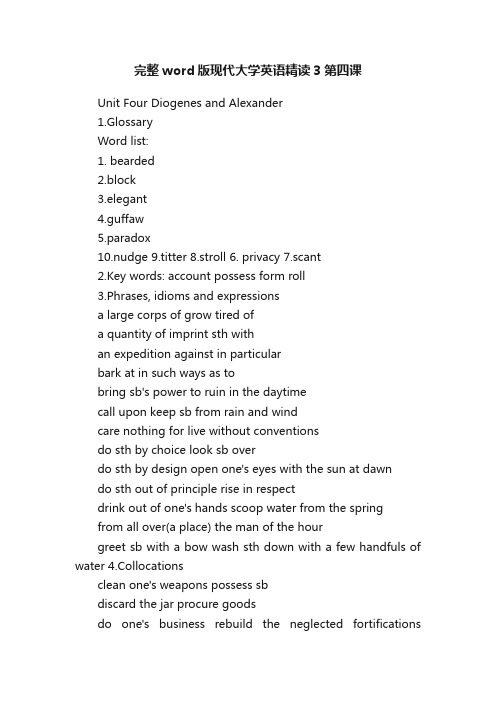
完整word版现代大学英语精读3第四课Unit Four Diogenes and Alexander1.GlossaryWord list:1. bearded2.block3.elegant4.guffaw5.paradox10.nudge 9.titter 8.stroll 6. privacy 7.scant2.Key words: account possess form roll3.Phrases, idioms and expressionsa large corps of grow tired ofa quantity of imprint sth withan expedition against in particularbark at in such ways as tobring sb's power to ruin in the daytimecall upon keep sb from rain and windcare nothing for live without conventionsdo sth by choice look sb overdo sth by design open one's eyes with the sun at dawndo sth out of principle rise in respectdrink out of one's hands scoop water from the springfrom all over(a place) the man of the hourgreet sb with a bow wash sth down with a few handfuls of water 4.Collocationsclean one's weapons possess sbdiscard the jar procure goodsdo one's business rebuild the neglected fortificationsemulate sb scratch one's backerase the old markings seek employmentescape complexities and extravagances stir sbexpound one's doctrine take commands nose'wipe on inhabit such a thing/placemock and satirize sb5.Word formation: -ware(earthware) auto/ n.+adj.6.Grammar1) using present participle as adverbial modifiers2) the first to/the first who…7.Back ground information1) Author2) Diogenes and Alexander3) Cynicism4) Other famous scholar at that age: Aristotle Plato Socrates8 Text structure and the main idea of this passage9.Preview questions about the text.1)What do you know about the historical background of the people discussed in the essay?What would be the corresponding period in our own history?2) What does the essay tell us about Diogenes and Alexander?3) What is a possible reason for an author to take the time to write an essay like this describingpeople who are long dead and gone?4) How is the essay structured?5) Try to find more information about these two historical figures to share with your classmate.10.Writing DevicesDiction 1)Contrast 2)Analogy3)Transferred epithet 4)Sentence Paraphrase 11.with the sun at dawn, scratched, done his business like a dog at the 1) He had opened his eyes (para1)…roadsideand complexities escape are without conventions, which artificial and false; Live 2)(para4)…extravagances3) They possess him. He is their slave. In order to procure a quantity of false, perishable goods he has sold the only true, lasting good, his won independence.(para4)(para5)”…to restamp the currency“s aim was clear to him: it was '4) His life5) He was the man of the hour, of the century…(para13)Quiz1)1.His doctor prescribed some foods that can _____ needed protein and vitamins to the diet.a. facilitateb. furnishc. supplyd. equip2. The troops _____ the area before the civilians were allowed to return.a. securedb. ensuredc. storedd. provided3. She ____ her family by working in a hospital.a. provides againstb. provides forc. provides withd. provides to4. You may keep the book a further week ____ no one else requires it.d. even ifc. in case b. if onlya. provided that5. He has ____ his small company into a corporate giant.b. altered a. variedd. transformedc. converted6. I want to ____ some Hong Kong dollars into American dollars.d. transformc. convert a. modifyb. turn7. The river ____ through beautiful country.d. patrolsc. sauntersa. strollsb. wanders8. At night these busy streets during the day become ____ of traffic.d. blankc. hollow a. vacant b. empty9. Theirs is at best a ____ form of flattery.d. sunkena. vacantb. voidc. hollow10. Don't walk on that broken glass with ____feet.d. nudeb. barrenc. sterile a. barefeed the animals. 11. On no account ____a. are the visitors allowed tob. the visitors are allowed toc. are allowed the visitors tod. the visitors are to allowed12. Scarcely ____ lost his temper.a. never he hasb. never has hec. ever has hed. he has ever13. Not until yesterday ____ his mind.a. he changedb. he didn't changec. he did changed. did he change14. No sooner ____ he was asked to leave again.a. he had arrived thanb. he arrived whenc. had he arrived thand. whenhearrived15. Jack is ____ hardworking than his sister, but he failed in the exam.d. no moreb. no lessc. not morea. not less16. His humor was ____ make everyone in the room burst out laughing.a. so as tob. such as toc. so thatd. such that17. A pen is to a writer, ____ a gun is to a fighter.a. asb.likec. thatd. what18. He is a good man and is known ____ to everyone.a. such asb. as thatc. as suchd. so that19. ____ the spirit is exhausted by overwork, ____ it is destroyed by idleness.a. So…thatb. Such…thatc. Such…asd. As…so20. That trumpet player was certainly loud. But I wasn't bothered by his loudness ___ by his lack of talent.a. thanb. ratherc. asd. so much as2) Match the items in the two columnsAll that glitters is not gold. No cross, no crown. Forgive and forget.Money makes a mare go.All are not thieves thatA golden key opens every door.dogs bark at.One misfortune rides on We have only a shortlife to live.nother's back.aEvery bird likes its own nest. Let bygones be bygones. Life is but a span. Hardship never comes alone.East or west home is best.No pains, no gains.。
现代大学英语精读3lesson11SilentSpring(可编辑)

Unit 11 Silent Spring Saving Nature NotOnly for Men Translate the following into English 1 塑造年轻人的心灵2 涂上黄油3 污染环境4 克制冲动5 喷上油漆6 缓和口气7 造成未曾料到的伤害8 赏心悦目9 解决这一争端10 挖一口井 1 evil spell 2 browned and withered vegetation 3 harshreality 4 air contamination 5 lethal weapon 6 synthetic materials 7advance investigation 8 a life-and-death struggle 9 introduced species 10 natural reserves 11 intensification of agricultureJulia Roberts In the drama Erin Brockovich 2000 Roberts plays adivorced mother The role earned Roberts the Golden Globe Award for bestdramatic actress and the Academy Award for best actress monitoring well监控井 hexavalent[化]有六价的 chromium n铬 toxicologist n毒物学者 PGEname of a company 1 Does the woman think that the water is poisonousWhy or why not ---No the woman doesnt think that the water is poisonousbecause the guys from PGE told her that the water was fine and the doctorpaid by PGE also told her the same 2 Do you think that PG E deliberatelycheat these people ---Yes 3 What do you think should the woman and herfamily do if theres really something poisonous in their water ---Theyshould bring a suit against the PGE companyEnvironmentalprotection organizations Green Party a Britishpolitical party that aims to protect the environment It is against the use of nuclear power and other forms of industry and transport which it considers harmful It was formed in 1973 as the Ecology Party and changed its name to the Green Party in 1985 Other countries also have parties that share the same name and ideals Green Rally Green parties which focus on environmental concerns as well as social change emerged as a political force in Europe in the 1980s Shown here supporters of the green political movement demonstrate in Paris Greenpeace A large international pressure group that aims to protect the environment Its members are well known for taking direct action and putting their own lives in danger in order to stop people from harming the environment For example they often go out in small boats to stop people from killing whales or throwing poisonous materials into the sea Greenpeace Flagship Rainbow Warrior This photo shows Greenpeaces flagship Rainbow Warrior which was launched in 1989 on the fourth anniversary of the sinking of its namesake The original Rainbow Warrior was sunk in a New Zealand port by French agents to prevent Greenpeace protests against nuclear tests in the South Pacific The ship was named after the warriors of the rainbow who according to a Native American prophecy were predicted to save the earth from ecological disaster The Environmental Protection Agency A US government organization that established rules and standards for the protection of the environment eg against pollution Gaiahypothesis The theoryput forward by British scientist James ELovelock in the early 1970s that the earth is a single living organismGaia was the ancient Greeks earth goddess Lovelock suggests that the earthis self-regulating like the human body Gaia theory worships the earth tothe point of excess Protagoras c481–411 BC Greek philosopher one ofthe most renowned Sophists professional teacher in Greece in the 5thcentury BC now known mainly for his saying that Man is the measure ofall things The retention of heat by the lower layers of the Earthsatmosphere which it is believed will cause a rise in temperature of theEarth and its atmosphere known as global warming Divisions of theAtmosphere 热层 Thermosphere 中间层 Mesosphere 臭氧层 Ozone Layer平流层 Stratosphere 对流层 Troposphere Without our atmosphere therewould be no life on Earth A relatively thin envelope the atmosphereconsists of layers of gases that support life and provide protection fromharmful radiation Chinas Air Pollution A report released in 2004 by the。
现代大学英语精读3(第二版)Lesson 2

Some tics
The average American read 7, the average French and Japanese person 8.4, the average South Korean 11, and the average Chinese 4.39. On average, Chinese people allocated just over 15 minutes a day to reading, compared to almost 100 to watching television and over 45 for using the Internet.
Warming up
Check-on Preview
What do you know about the following novels?
Middlemarch
Jane Eyre
A Tale of Two Cities Moby-Dick Pride and Prejudice To Kill a Mockingbird
How Reading Changed My Life
Anna Quindlen
o
R
I
G
I
N
World Book and Copyright Day is a yearly event on 23rd April, organized by UNESCO to promote reading, publishing and copyright. World Book Day was celebrated for the first time on April 23rd. The connection between 23 April and books was first made in 1923 by booksellers in Spain as a way to honor the author Miguel de Cervantes who died on that day. (because the date is also the anniversary of the birth and death of William Shakespeare.)
现代大学英语精读3 课文 Paraphrase

UNIT 1…identity is determined by genetic endowment, shaped by environment, and influenced by chance events.…our identity is decided by our genes (inherited from parents), greatly influenced by environment we live in and affected by some unexpected events.First, there is functional independence, which involves the capability of individuals to take care of practical and personal affairs, such as handling finances, choosing their own wardrobes, and determining their daily agenda.First, there is the independence in handling everyday life situations, which involves the ability to solve practical problems, such as how to spend money wisely, choosing their own clothes, and determining what they are going to do everyday.Fourth is freedom from “excessive guilt, anxiety, mistrust, responsibility, inhibition, resentment, and anger in relation to the mother and father.’’Children often feel very guilty in relation to their parents because they think they have done something wrong; they are also anxious because they are always eager to please their parents; they sometimes feel unhappy because they think that their parents have not fair to them; they feel that they are responsible to their parents for everything they do; they are always afraid of not saying the right thing or not behaving properly; all these may make them angry with their parents or make them resentful. These feelings reflect their emotional dependence on their parents. When they grow up, they usually strive for the freedom from such dependence.Perh aps one of the most stressful matters…as men or women.Perhaps young college students feel most distressed in finding out their sexual identity, including associating with the opposite sex and designing their future roles as men or women.Probably nothing can make students feel lower or higher emotionally than the way they are relating to whomever they are having a romantic relationship with.When students are in a romantic relationship with the opposite sex, they are most likely to feel unhappy or happy emotionally.dragging his feet with a dismayed, dejected look on his face.walking slowly and listlessly, looking very unhappy and disappointed“to drag one’s feet” is often used figuratively to mean”to delay deliberately”The local authorities are dragging their feet closing small coal mines.During the course I had come to realize that while my world was expanding and new options were opening for me, my father, who was in his sixties, was seeing his world shrink and his options narrow. (6)From the course I learnt, I had discovered that different from my expanding world and more opportunities; my father was beginning to realize that his world was getting smaller and his choices fewer.These religious, morals, and ethical values that are set during the college years often last a lifetime.(7)These values that are established during the college years often last a lifetime. It is believed that our character or basic moral principles are formulated during this period of time.I can no longer read the newspaper or watch a television newscast without seeing the people from other countries in a different light. in a different wayWhenever I read the newspaper or watch a television newscast, I will see the people from other countries in a different way from what I used to see.☻What he did made us to see him in a new light.☻In the light of the new evidence, we decide to take him to court. 出于,考虑到Not only are they being introduced to new people and new knowledge, but they are also acquiring new ways of assembling and processing information. (10)They are getting to know a lot of new people and learning new knowledge. They are also finding or learning new ways of arranging, organizing, analyzing or understanding information.UNIT 2It was a wonder to me they'd want to be seen with such a windbag.我不理解为什么他们愿意让人看见自己和这样一个话匣子在一起。
现代大学英语精读3+Lesson+11+Silent+Spring

❖ DATE OF DEATH: April 14, 1964
❖ PLACE OF DEATH: Her home in Silver Spring, MD
❖ PORTRAYED BY: Celeste Earhart
❖ WEB SITES:
❖ Rachel Carson Homestead Rachel Carson Council Rachel Carson National Wildlife Refuge Rachel Carson Forum - a center for "new ideas and opinions about environmental issues facing Pennsylvania." Former Vice-President Al Gore's Introduction to the 1994 reissue of Silent Spring Rachel Carson is a charter inductee into the Ecology Hall of Fame
❖ BIBLIOGRAPHY:
❖ 1941-Under the Sea Wind 1943-Food From the Sea: Fish and Shellfish of New England 1944-Food From the Sea: Fish and Shellfish of the South Atlantic 1951-The Sea Around Us 1955-The Edge of the Sea 1962-Silent Spring 1965-The Sense of Wonder (posthumous)
(完整版)现代大学英语精读3课文电子版
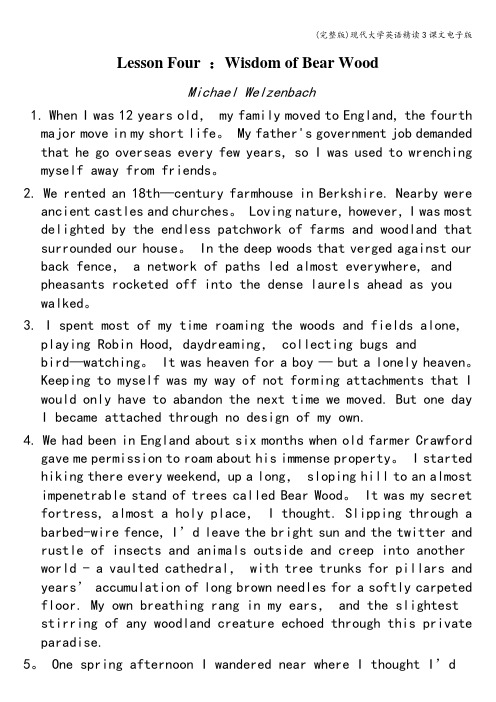
Lesson Four :Wisdom of Bear WoodMichael Welzenbach1. When I was 12 years old, my family moved to England, the fourthmajor move in my short life。
My father's government job demanded that he go overseas every few years, so I was used to wrenching myself away from friends。
2. We rented an 18th—century farmhouse in Berkshire. Nearby wereancient castles and churches。
Loving nature, however, I was most delighted by the endless patchwork of farms and woodland that surrounded our house。
In the deep woods that verged against our back fence, a network of paths led almost everywhere, and pheasants rocketed off into the dense laurels ahead as you walked。
3. I spent most of my time roaming the woods and fields alone,playing Robin Hood, daydreaming, collecting bugs andbird—watching。
It was heaven for a boy —but a lonely heaven。
现代大学英语精读3 your college years

W
B
T
L
E
Lesson 1 – Your College Years
I.
Text Analysis
In fact, it may be heightened by their choice to pursue a college education. Question: What does “it” refer to here?
Sentence paraphrase
Lesson 1 – Your College Years
I.
Text Analysis
In Para. 6
பைடு நூலகம்I was relating to my father in a different way.
Question: What are the differences between the ways “I” related to “my” father in the past and at present? What type of change does the example reflect? In the past “I” was encouraged by “my” father; now “I” was encouraging him. The example reflects the change that college students are learning how to give and receive affection in the adult world.
W
B
T
L
E
Lesson 1 – Your College Years
I.
第二版 现代大学英语精读 3 Unit1 Your- College- Years

Stage 2: Toddler Autonomy vs Shame and Doubt Works to master physical environment while maintaining self-esteem.
Spring
Freshman
Summer
Sophomore
Junior
Senior
Freshman: Spring
Spring is the season for nature to revive, to grow and to get ready to boom. Similarly, in college, spring is the season for you to acquire knowledge, to develop yourself and to lay a solid foundation for the future. It’s the season of growth.
Part 1 Warm-up
Warm-up questions
College Years vs. Seasons
Warm-up Questions
1. As a sophomore, what is your general impression of college?
the golden time in one’s life many opportunities for one to explore the unknown experiencing a lot making lifelong friends enjoying various kinds of activities developing one’s personal interests keeping a good balance and laying a solid foundation …
现代大学英语-精读3-Diogenes-and-Alexander-原文

Diogenes and AlexanderLying on the bare earth, shoeless, bearded, half-naked, he looked like a beggar or a lunatic(神经病,疯子). He was one, but not the other. He had opened his eyes with the sun at dawn (拂晓), scratched, done his business like a dog at the roadside, washed at the public fountain, begged a piece of breakfast bread and a few olives, eaten them squatting on the ground, and washed them down with a few handfuls of water scooped from the spring. (Long ago he had owned a rough wooden cup, but he threw it away when he saw a boy drinking out of his hollowed hands.) Having no work to go to and no family to provide for, he was free. As the market place filled up with shoppers and merchants and slaves and foreigners, he had strolled through it for an hour or two. Everybody knew him, or knew of him. They would throw sharp questions at him and get sharper answers. Sometimes they threw bits of food, and got scant thanks; sometimes a mischievous pebble, and got a shower of stones and abuse(漫骂). They were not quite sure whether he was mad or not. He knew they were mad, each in a different way; they amused him. Now he was back at his home.It was not a house, not even a squatter's hut. He thought everybody lived far too elaborately, expensively, anxiously. What good is a house? No one needs privacy: natural acts are not shameful; we all do the same thing, and need not hide them. No one needs beds and chairs and such furniture: the animals live healthy lives and sleep on the ground. All we require, since nature did not dress us properly, is one garment to keep us warm, and some shelter from rain and wind. So he had one blanket—to dress him in the daytime and cover him at night—and he slept in a cask. His name was Diogenes. He was the founder of the creed called Cynicism ; he spent much of his life in the rich, lazy, corrupt Greek city of Corinth, mocking and satirizing its people, and occasionally converting one of them.His home was not a barrel made of wood: too expensive. It was a storage jar made of earthenware, no doubt discarded because a break had made it useless. He was not the first to inhabit such a thing,But he was the first who ever did so by choice, out of principle.Diogenes was not a maniac(疯子). He was a philosopher who wrote plays and poems and essays expounding(解释) his doctrine; he talked to those who cared to listen; he had pupils who admired him. But he taught chiefly by example. All should live naturally, he said, for what is natural is normal and cannot possibly be evil or shameful. Live without conventions, which are artificial and false; escape complexities and extravagances: only so can you live a free life. The rich man believes he possesses his big house with its many rooms and its elaborate furniture, his expensive clothes, his horses and his servants and his bank accounts. He does not. He depends on them,he worried about them,he spends most of his energy looking after them;the thought of losing them makes him sick with anxiety.They process them,He is their slave. In order to procure a quantity of false, perishable goods he has sold the only true, lasting good, his own independence.There have been many men who grew tired of human society with its complications, and went away to live simply—on a small farm, in a quiet village, in a hermit's cave. Not so Diogenes. He was a missionary. His life's aim was clear to him: it was "to restamp the currency “ :to take the clean metal of human life, to erase the old false conventional markings, and to imprint it with its true values.The other great philosophers of the fourth century BC,such as Plato and Aristotle, taught mainly their own private pupils.But for Diogenes, laboratory and specimens and lecture halls and pupils were all to be found in a crowd of ordinary people. Therefore, he chose to live in Athens or Corinth, where travelers from all over the Mediterranean world constantly came and went. And, by design, he publicly behaved in such ways as to show people what real life was.He thought most people were only half-alive, most men only half-men. At bright noonday he walked through the market place carrying a lighted lamp and inspecting the face of everyone he met. They asked him why. Diogenes answered, "I am trying to find a man."To a gentleman whose servant was putting on his shoes for him, Diogenes said, "You won't be really happy until he wipes your nose for you: that will come after you lose the use of your hands."Once there was a war scare so serious that it stirred even the lazy, profit-happy Corinthians. They began to drill, clean their weapons, and rebuild their neglected fortifications. Diogenes took his old cask and began to roll it up and down, back and forward. "When you are all so busy," he said, "I felt I ought to do something!"And so he lived—like a dog, some said, because he cared nothing for conventions of society, and because he showed his teeth and barked at those he disliked. Now he was lying in the sunlight, contented and happy, happier than the Shah of Persia. Although he knew he was going to have an important visitor, he would not move.The little square began to fill with people. Page boys , soldiers,secretaries, officers, diplomats, they all gradually formed a circle centered around Diogenes. He looked them over as a sober man looks at a crowd of tottering drunks, and shook his head. He knew who they were. They were the servants of Alexander, the conqueror of Greece, the Macedonian king, who was visiting his new realm.Only twenty, Alexander was far older and wiser than his years. Like all Macedonians he loved drinking, but he could usually handle it; and toward women he was nobly restrained and chivalrous. Like all Macedonians he loved fighting; he was a magnificent commander, but he was not merely a military automaton. He could think. At thirteen he had become a pupil of the greatest mind in Greece, Aristotle. who gave him the best of Greek culture. He taught Alexander poetry; the young prince slept with the Iliad under his pillow and longed to emulate Achilles, who brought the mighty power of Asia to ruin. He taught him philosophy, in particular the shapes and uses of political power and he taught him the principles of scientific research, and shipped hundreds of zoological specimens back to Greece for study. Indeed, it was from Aristotle that Alexander learned to seek out everything strange which might be instructive.Now, Alexander was in Corinth to take command of the League of Greek States which his father Philip created. He was welcomed and honored and flattered. He was the man of thehour, of the century; he was unanimously appointed commander-in-chief of a new expedition against old, rich, corrupt Asia. Nearly everyone crowded to Corinth in order to congratulate him, to seek employment with him.Only Diogenes, although he lived in Corinth, did not visit the new monarch. With that generosity which Aristotle had taught him, Alexander determined to call upon Diogenes.With his handsome face, his fiery glance, his strong supple body, his purple and gold cloak, and his air of destiny, he moved through the parting crowd, toward the Dog's kennel. When a king approaches, all rise in respect. Diogenes merely sat up on one elbow. When a monarch enters a place, all greet him with a bow or an acclamation. Diogenes said nothing.There was a silence. Alexander spoke first, with a kindly greeting. Looking at the poor broken cask, the single ragged garment, and the rough figure lying on the ground, he said, "Is there anything I can do for you, Diogenes?""Yes," said the Dog. "Stand to one side. You're blocking the sunlight."There was an amazed silence. Slowly, Alexander turned away. A titter broke out from the elegant Greeks. The Macedonian officers, after deciding that Diogenes was not worth the trouble of kicking, were starting to guffaw and nudge one another. Alexander was still silent. To those nearest him he said quietly, "If I were not Alexander, I should be Diogenes." They took it as a paradox.But Alexander meant it. He understood Cynicism as the others could not.He was what Diogenes called himself, a "citizen of the world." Like Diogenes, he admired the heroic figure of Hercules, who labored to help mankind while all others toiled and sweated only for themselves. He knew that of all men then alive in the world only Alexander the conqueror and Diogenes the beggar were free.。
现代大学英语精读3lesson14MercyatAppomattox(可编辑)
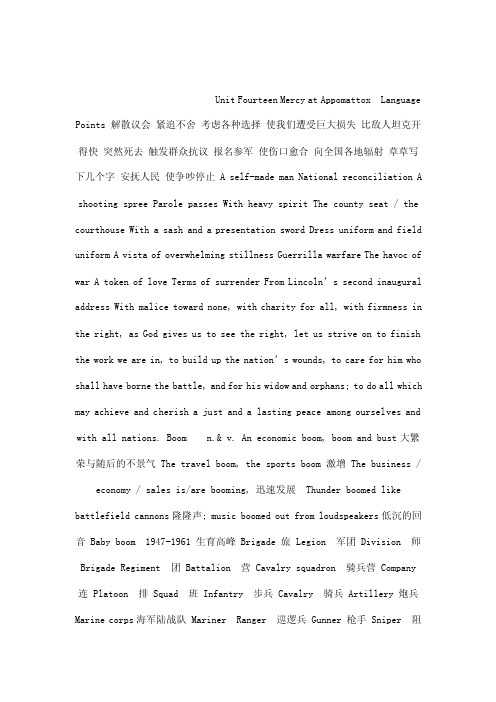
Unit Fourteen Mercy at Appomattox Language Points 解散议会紧追不舍考虑各种选择使我们遭受巨大损失比敌人坦克开得快突然死去触发群众抗议报名参军使伤口愈合向全国各地辐射草草写下几个字安抚人民使争吵停止 A self-made man National reconciliation A shooting spree Parole passes With heavy spirit The county seat / the courthouse With a sash and a presentation sword Dress uniform and field uniform A vista of overwhelming stillness Guerrilla warfare The havoc of war A token of love Terms of surrender From Lincoln’s second inaugural address With malice toward none, with charity for all, with firmness in the right, as God gives us to see the right, let us strive on to finish the work we are in, to build up the nation’s wounds, to care for him who shall have borne the battle, and for his widow and orphans; to do all which may achieve and cherish a just and a lasting peace among ourselves and with all nations. Boom n.& v. An economic boom, boom and bust大繁荣与随后的不景气 The travel boom, the sports boom 激增 The business / economy / sales is/are booming, 迅速发展 Thunder boomed like battlefield cannons隆隆声; music boomed out from loudspeakers低沉的回音 Baby boom 1947-1961 生育高峰 Brigade 旅 Legion 军团 Division 师Brigade Regiment 团 Battalion 营 Cavalry squadron 骑兵营 Company 连 Platoon 排 Squad 班 Infantry 步兵 Cavalry 骑兵 Artillery 炮兵Marine corps海军陆战队 Mariner Ranger 巡逻兵 Gunner 枪手 Sniper 阻击手 Cannoneer 炮手 Perdue 敢死队员 delicate ~ hands small and beautifully shaped ~ flavor color, taste, or smell that is pleasant, not strong or intense ~ china easy to harm, damage or break Physically ~ become ill easily ~ situation, problem, matter, discussion微妙 ~ operation showing great skill and attention to detail exult He was ~ing in a win at the show earlier that day. Some individual investors ~ed at the record. Resolve n.& v. ~ to do: make a firm decision to do She ~d to report the crime / that … This will strengthen the American public’s ~ to go to war. resolve 1 决心,决定 2)溶解 3)解决 Resolve to do sth Resolve on doing sth Resolve into sth Cf. resolve, decide, determine She resolved on making an early start. 她决定早早出发。
现代大学英语精读(3) Unit 13
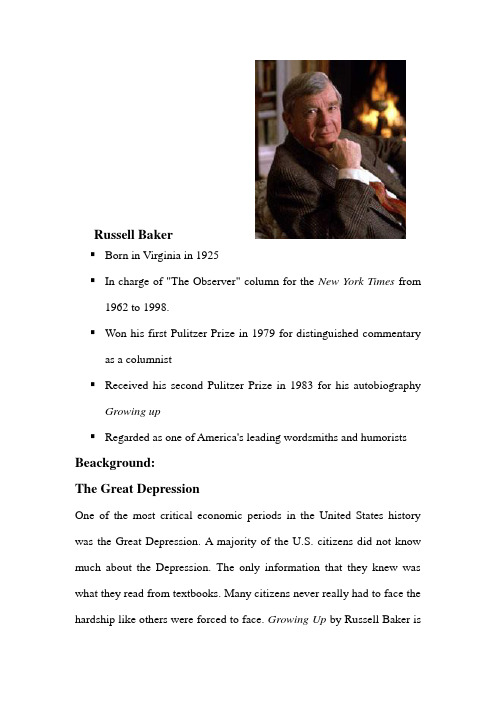
Russell Baker▪Born in Virginia in 1925▪In charge of "The Observer" column for the New York Times from 1962 to 1998.▪Won his first Pulitzer Prize in 1979 for distinguished commentary as a columnist▪Received his second Pulitzer Prize in 1983 for his autobiography Growing up▪Regarded as one of America's leading wordsmiths and humorists Beackground:The Great DepressionOne of the most critical economic periods in the United States history was the Great Depression. A majority of the U.S. citizens did not know much about the Depression. The only information that they knew was what they read from textbooks. Many citizens never really had to face the hardship like others were forced to face. Growing Up by Russell Baker isan autobiography on the problems he and his family endured during this era.Causes of the Great Depression:▪Speculation(投机) in the 1920s caused many people to buy stocks with loaned money. The stock market boom was very unsteady, because it was based on borrowed money and false optimism.▪Politicians believed that business was the key business of America.Thus, the government took no action against unwise investing.▪Stock Market crash on October 24, 1929 (black Thursday)Misery and personal sufferings were widespread.▪Living conditions changed when multiple families crowded into small houses or apartments.▪Unemployment rate was very high.▪Thousands went hungry.▪Children suffered long term effects from a poor diet and inadequate medical care.▪Women continued to doing women’s work such as nursing, and even if they were able to get an industry job which seldom hired women, they usually were paid less than men.Language Study:preside [pri'zaid]v.act as presidentpreside over companies and corporationsvi.主持,担任会议主席to chair, run the showvt.管理manage, conduct, run, direct, controlovergrown [,əuvə'ɡrəun]adj.1. covered with growing plants2. abounding in usually unwanted vegetationadj.蔓生的;生长过快的conceive [kən'si:v]v.1. have the idea forHe conceived of a robot that would help paralyzed patients This library was well conceived2. judge or regard; look upon; judgeThe racist conceives such people to be inferior3. become pregnant; undergo conceptionShe cannot conceive My daughter was conceived in Christmas Day vt.怀孕;构思;以为;持有design, holdvi.怀孕;设想;考虑allow, think of, think aboutinconceivable [,inkən'si:vəbl]adj.totally unlikelyadj.不可思议的;难以置信的;不能想象的incrediblepromptly [prɔmptli]adv.1. with little or no delaythe rescue squad arrived promptlyadv. 迅速地;立即地;敏捷地quickly, rapidlydismiss [dis'mis]v.1. bar from attention or considerationShe dismissed his advances2. cease to consider; put out of judicial considerationThis case is dismissed!3. stop associating with4. terminate the employment ofvt.解散;解雇;开除;让...离开remove, fire outvi.解散disband, break upadv.迅速地;立即地;敏捷地quickly, rapidly, fast, readyhazy ['heizi]adj.1. filled or abounding with fog or mist2. indistinct or hazy in outlineadj.朦胧的;模糊的;有薄雾的fuzzy, dark, vaguehazy blue 朦胧的蓝色briskly ['briskli]adv.in a brisk mannershe walked briskly in the cold air `after lunch,' she said briskly adv.迅速地;活泼地;尖刻地quickly, rapidly, fast, promptly, readyfierce [fiəs]adj.1. marked by extreme and violent energyfierce fighting2. marked by extreme intensity of emotions or convictions; inclined to react violently; fervidfierce loyalty3. ruthless in competition4. violently agitated and turbulentthe fierce thunders roar me their musicadj.凶猛的;猛烈的;暴躁的fell, violent, hardthrust [θrʌst]n.. the force used in pushingv.push forcefullyHe thrust his chin forwardn.[力]推力;刺pushing forcecustomary ['kʌstə,məri]adj.1. in accordance with convention or customsealed the deal with the customary handshake2. commonly used or practiced; usualtook his customary morning walkadj.习惯的;通常的usual, used, common, accustomedformidable ['fɔ:midəbl]adj.1. extremely impressive in strength or excellencea formidable opponent the challenge was formidable had a formidable array of compositions to his credit the formidable army of brains at the Prime Minister's disposal2. inspiring fearthe formidable prospect of major surgeryadj.强大的;可怕的;令人敬畏的;艰难的powerful, terrible, august, horribletrip [trip]vi.绊倒;远足;犯错误;轻快地走excurse, make a mistaken.旅行;绊倒;差错journey, tour, travelsyn: stumbledebris ['deibri:]n.the remains of something that has been destroyed or broken up n.碎片,残骸remain, chipgravy ['ɡreivi]n.1. basically the juices that drip from cooking meatsn.肉汁;不法利润;轻易得来的钱bovril, gippobattered ['bætəd]adj.1. damaged by blows or hard usagea battered old car2. damaged especially by hard usagehis battered old hatadj.破旧的;磨损的;弄垮的;受到虐待的wearing, shotv.连续猛击;磨损(batter的过去分词)wornferocityn.凶猛;凶恶,残忍;暴行变形:crueltysenility [si'niləti; se-]n.1. 老年;年老,年岁大2. 老态龙钟;老朽,年老昏聩silver lining1. 云朵的银色边缘2. 一线希望(或慰藉)banal [bə'nɑ:l, 'beinəl]adj.repeated too often; overfamiliar through overuse adj.陈腐的;平庸的;老一套的silver lining n.a consoling aspect of a difficult situation senility [si'niləti, se-]n.1. mental infirmity as a consequence of old age; sometimes shown by foolish infatuations2. the state of being senile。
现代大学英语精读3_Lesson_9_A_Dill_Pickle
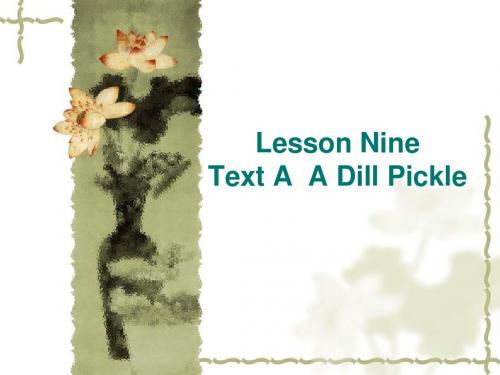
2
To be continued on the next page.
Lesson 9 – A Dill Pickle
III. Pictures
The Black Sea
The Black Sea (known as the Euxine Sea in antiquity) is an inland sea between southeastern
To be continued on the next page.
Lesson 9 – A Dill Pickle
III. Pictures
Kew Gardens
Kew Palace was the home of Augusta,
Princess of
Wales in the 18th century.
satellite view of the Black Sea
To be continued on the next page.
Lesson 9 – A Dill Pickle
III. Pictures
The Black Sea
Countries bordering on the Black Sea are Turkey, Bulgaria, Romania, Ukraine, Russia and Georgia. From this map, we can see that important cities along the coast include: Istanbul, Burgas and so on.
To be continued on the next page.
Lesson 9 – A Dill Pickle
I.
现代大学英语精读笫三册l
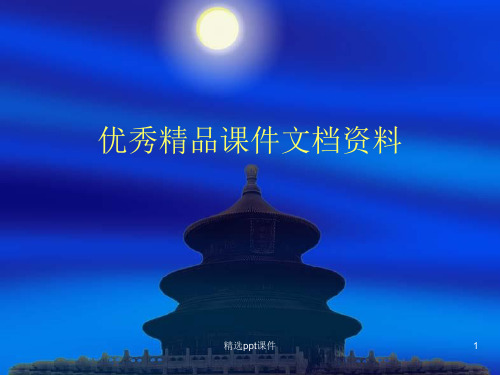
精选ppt课件
13
换称:(1)biblical or mythological figures (宗教或神话渊源)
Solomon(所罗门) – a wise man(聪明人)
Daniel(丹尼尔) – a wise and fair judge(聪 明而公正的法官)
Judas(犹大) – a traitor(叛徒)
her—and of how it used to exasperate her six years ago.
(12)
To exasperate: to annoy, to vex, to irritate very much.
精选ppt课件
5
I am still just as ignorant for all your telling me. (13)
优秀精品课件文档资料
精选ppt课件
1
LESSON NINE
The Dill Pickle
精选ppt课件
2
He was peeling an orange. (1)
To peel an orange: to take off the peel of an orange.
To peel potatoes; to husk剥去 ...的皮[壳] the rice; to shell the peas去壳除去…的壳;剥… 外皮;shell oysters.剥牡蛎; to weed the garden给花园除杂草; to gut取出内脏the fish; to dust掸掉...上的灰尘the tables.
Hercules(赫丘利) – a hero of strength and bravery(大力神)
- 1、下载文档前请自行甄别文档内容的完整性,平台不提供额外的编辑、内容补充、找答案等附加服务。
- 2、"仅部分预览"的文档,不可在线预览部分如存在完整性等问题,可反馈申请退款(可完整预览的文档不适用该条件!)。
- 3、如文档侵犯您的权益,请联系客服反馈,我们会尽快为您处理(人工客服工作时间:9:00-18:30)。
Lesson Four :Wisdom of Bear WoodMichael Welzenbach1. When I was 12 years old, my family moved to England, thefourth major move in my short life. My father’s government job demanded that he go overseas every few years, so I was used to wrenching myself away from friends.2. We rented an 18th-century farmhouse in Berkshire. Nearby wereancient castles and churches. Loving nature, however, I wasmost delighted by the endless patchwork of farms andwoodland that surrounded our house. In the deep woods thatverged against our back fence, a network of paths led almosteverywhere, and pheasants rocketed off into the dense laurels ahead as you walked.3. I spent most of my time roaming the woods and fields alone,playing Robin Hood, daydreaming, collecting bugs andbird-watching. It was heaven for a boy — but a lonely heaven.Keeping to myself was my way of not forming attachments thatI would only have to abandon the next time we moved. But oneday I became attached through no design of my own.4. We had been in England about six months when old farmerCrawford gave me permission to roam about his immenseproperty. I started hiking there every weekend, up a long,sloping hill to an almost impenetrable stand of trees called Bear Wood. It was my secret fortress, almost a holy place, I thought.Slipping through a barbed-wire fence, I’d leave the bright sun and the twitter and rustle of insects and animals outside andcreep into another world — a vaulted cathedral, with tree trunks for pillars and years’ accumulation of long brown needles for a softly carpeted floor. My own breathing rang in my ears, and the slightest stirring of any woodland creature echoed through this private paradise.5. One spring afternoon I wandered near where I thought I’dglimpsed a pond the week before. I proceeded quietly, careful not to alarm a bird that might loudly warn other creatures tohide.6. Perhaps this is why the frail old lady I nearly ran into was asstartled as I was. She caught her breath, instinctively touching her throat with her hand. Then, recovering quickly, she gave a welcoming smile that instantly put me at ease. A pair ofpowerful-looking binoculars dangled from her neck. “Hello,young man,” she said. “Are you American or Canadian?”7. American, I explained in a rush, and I lived over the hill, and Iwas just seeing if there was a pond, and farmer Crawford had said it was okay, and anyhow, I was on my way home, sogood-bye.8. As I started to turn, the woman smiled and asked, “Did you seethe little owl from the wood over there today?” She pointedtoward the edge of the wood.9. She knew about the owls? I was amazed.10. “No,” I replied, “but I’ve seen them before. Never close though.They always see me first.”11. The woman laughed. “Yes, they’re wary,” she said. “But then,gamekeepers have been shooting them ever since they got here.They’re introduced, you know, not native.”12. “They’re not?” I asked, fascinated. Anybody who knew thissort of stuff was definitely cool — even if she was trespassing in my special place.13. “Oh, no!” she answered, laughing again. “At home I havebooks on birds that explain all about them. In fact,” she saidsuddenly, “I was about to go back for tea and jam tart. Would you care to join me?”14. I had been warned against going off with strangers, butsomehow I sensed the old woman was harmless. “Sure,” I said.15. “I’m Mrs. Robertson-Glasgow,” she introduced herself,extending her fine hand.16. “Michael,” I said, taking it clumsily in my own.17. We set off. And as we walked, she told me how she and herhusband had moved to Berkshire after he’d retired as a college professor about ten years earlier. “He passed away last year,”she said, looking suddenly wistful. “So now I’m alone, and Ihave all this time to walk the fields.”18. Soon I saw a small brick cottage that glowed pinkly in thewestering sun. Mrs. Robertson-Glasgow opened the door and invited me in. I gazed about in silent admiration at thebookshelves, glass-fronted cases containing figures of ivory and carved stone, cabinets full of fossils, trays of pinned butterflies and, best of all, a dozen or so stuffed birds — including aglass-eyed eagle owl.19. “Wow!” was all I could say.20. “Does your mother expect you home at a particular time?” sheasked as she ran the water for tea.21. “No,” I lied. Then, glancing at the clock, I added, “Well,maybe by five.” That gave me almost an hour, not nearlyenough time to ask about every single object in the room. But between mouthfuls of tea and jam tart I learned all sorts ofthings from Mrs. Robertson-Glasgow.22. The hour went by much too swiftly. Mrs. Robertson-Glasgowhad to practically push me out the door. But she sent me home with two large tomes, one full of beautiful illustrations of birds, and one of butterflies and other insects. I promised to returnthem the next weekend if she didn’t mind my coming by. She smiled and said she’d look forward to that.23. I had made the best friend in the world.24. When I returned the books, she lent me more. Soon I began tosee her almost every weekend, and my well of knowledge about natural history began to brim over. At school, I earned thenickname “Prof” and some respect from my fellow students.Even the school bully brought me a dead bird he had found, or probably shot, to identify.25. During the summer I spent blissfully long days with my friend.I discovered she made the finest shortbread in the world. Wewould explore Bear Wood, munching happily and discussing the books she had lent me. In the afternoons we would return to the cottage, and she would talk about her husband — what a fine man he’d been. Once or twice she seemed about to cry and left the room quickly to make more tea. But she always came back smiling.26. As time passed, I did not notice that she was growing frailerand less inclined to laugh. Familiarity sometimes makes people physically invisible, for you find yourself talking to the heart —to the essence, as it were, rather than to the face. I suspected, of course, that she was lonely; I did not know she was ill.27. Back at school, I began to grow quickly. I played soccer andmade a good friend. But I still stopped by the cottage onweekends, and there was always fresh shortbread.28. One morning when I went downstairs to the kitchen, there wasa familiar-looking biscuit tin on the table. I eyed it as I went tothe refrigerator.29. My mother was regarding me with a strange gentleness. “Son,”she began, painfully. And from the tone of her voice I kneweverything instantly.30. She rested her hand on the biscuit tin. “Mr. Crawford broughtthese this morning.” She paused, and I could tell she washaving difficulty. “Mrs. Robertson-Glasgow left them for you.”31. I stared out the window, tears stinging my eyes.32. “I’m sorry, Michael, but she died yesterday,” she went on.“She was very old and very ill, and it was time.”33. My mother put her arm about my shoulder. “You made hervery happy, because she was lonely,” she said. “You werelucky to be such a good friend for her.”34. Wordlessly, I took the tin to my room and set it on my bed.Then, hurrying downstairs, I burst through the front door and ran to the woods.35. I wandered for a long time, until my eyes had dried and I couldsee clearly again. It was spring — almost exactly a year since I’d met the old woman in Bear Wood. I looked around me and realized how much I now knew. About birds, insects, plants and trees, thanks to her help. And then I remembered that back in my bedroom I had a tin of the best shortbread in the world, andI should go and eat it like I always did on weekends at Mrs.Robertson-Glasgow’s cottage.36. In time, that old round tin filled up with dried leaves, fossilsand bits of colorful stone, and countless other odds and ends. I still have it.37. But I have much more, the legacy of that long-ago encounter inBear Wood. It is a wisdom tutored by nature itself, about the seen and the unseen, about things that change and things that are changeless, and about the fact that no matter how seemingly different two souls may be, they possess the potential for that most precious, rare thing — an enduring and rewardingfriendship.。
